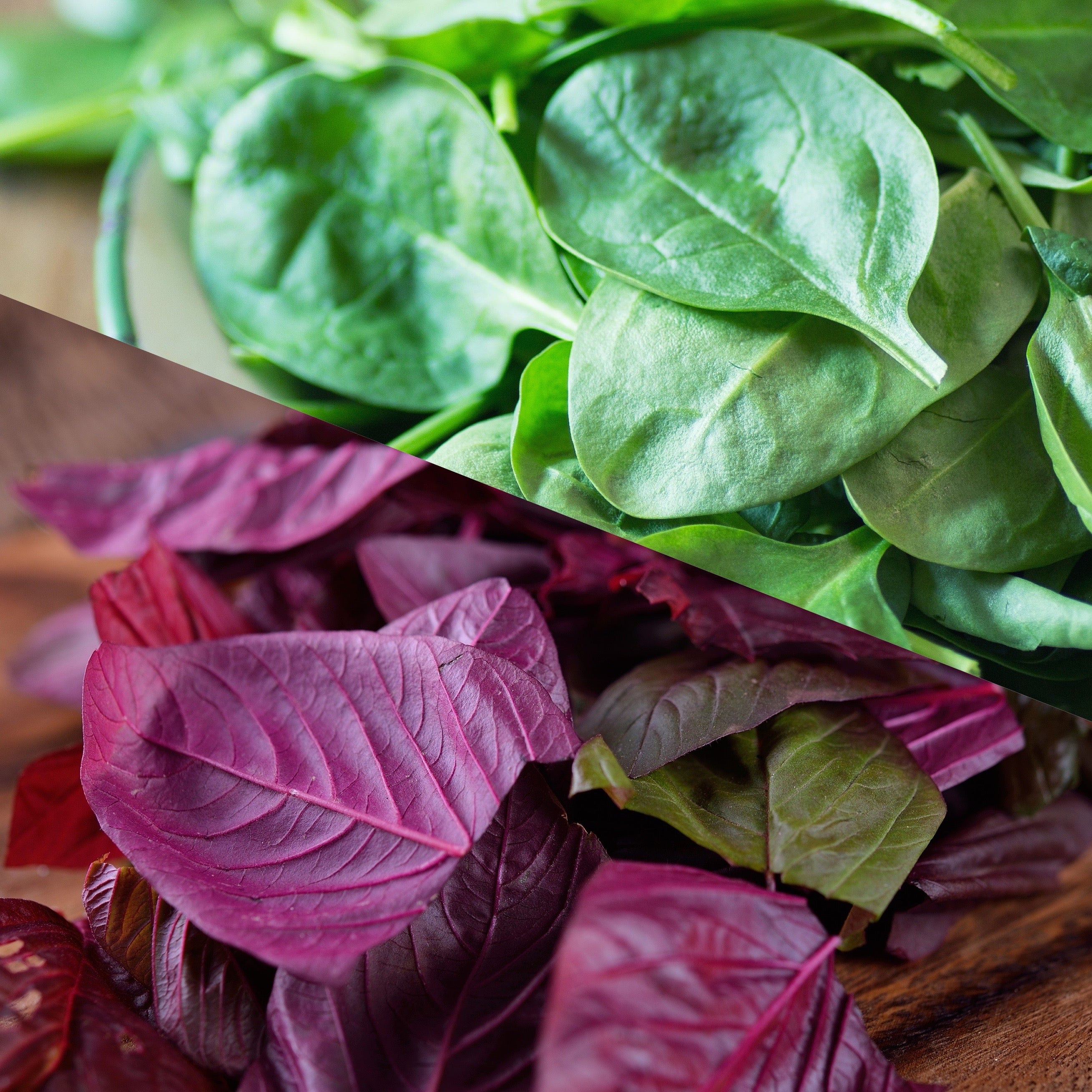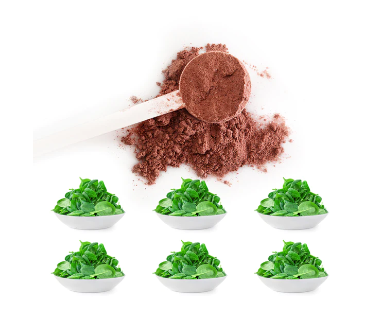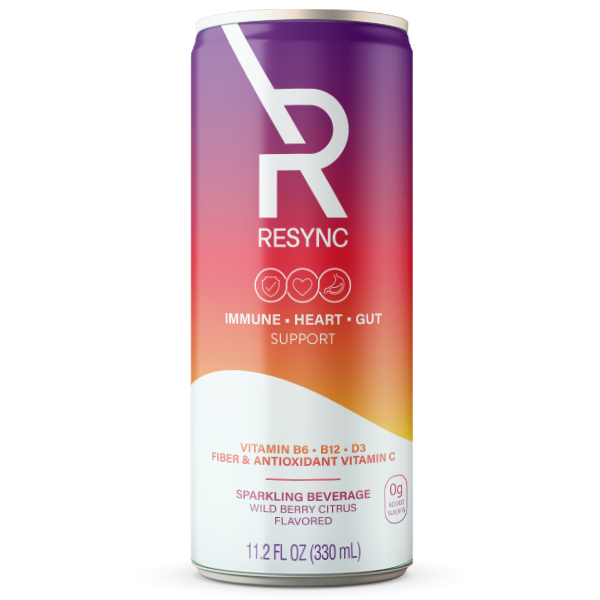
WHY RED SPINACH
IS BETTER THAN GREEN
Author Barbara Depta
Amaranth leaves, often called red spinach and green spinach, are nutrient-rich leafy vegetables that benefit your health. However, it is valuable to know that they do have two significant and distinct differences in nutritional profile. Let's take a deeper dive.
Amaranth (Red Spinach)
1. Nitrates
The most crucial difference between red and green spinach is their natural nitrate amount.
Amaranth leaves are a fantastic source of natural nitrates. Red spinach extract used in all Resync products is standardized to 9% where as red beet powder or extract, for example, can be naturally standardized to anywhere between 1.5% - 2 % nitrates depending on their harvesting region. To our knowledge, there are no standardized green spinach powders or extracts on the market, so we used red beet as a well-known source. That is the main reason Resync uses red spinach in each supplement.


1.5 Scoops of RESYNC Recovery = 6.5oz. of Spinach or Arugula
2. No Oxylates
Red spinach, contrary to green spinach, does not have any oxylates. Therefore, if you have kidney stones and want to avoid oxalates, you do not need to worry about that with red spinach.
Here are the additional values of red spinach.
- Protein: Amaranth leaves are a good source of plant-based protein.
- Iron: Red spinach is rich in iron, essential for oxygen transport in the body and other metabolic processes.
- Calcium: High in calcium, good for bone health.
- Vitamins: High levels of Vitamin A, C, and some B vitamins like folate.
- Antioxidants: Contains antioxidants like beta-carotene and other phytonutrients.
- Amino Acids: Contains a good amino acid profile, including lysine, which is not commonly found in plant foods.
- Other Minerals: Good levels of magnesium, phosphorus, and potassium.
It is important to note that when you consume red spinach, the bacteria in the mouth converts the nitrate from the vegetable to nitrite into nitric oxide. The conversion levels, of course, depend on many factors. Your oral hygiene is one of them.
If you want to learn how to increase nitric oxide through your diet, here is one of our previous blogs on recipes to support nitric oxide.
You already know that plant-based nitrates are good for your heart health. Many people use them to keep their blood pressure at healthy levels. Athletes use nitrates to increase their endurance, or like in the case of Resync, they use nitrates for recovery from training, practice, or simply a busy day.
Nitrates have even better anti-inflammatory results when mixed with polyphenols, like the one in the Aronia berry.
It is important to note when you consume nitrates, do not consume them with any fats. Why?
Through work that was done by the scientific community, Resync has learned that meals containing high dietary fat and a postprandial period 2-3 hours after a meal can lower the ability of nitrate in the diet to relax blood vessels because nitric oxide is soluble in fat. In that postprandial period, after a high nitrate material, dietary nitrate-containing foods like leafy green or red vegetables may not have that vaso-relaxing property if your diet is super high in fat.
If you have an atherogenic diet, you need more natural nitrate from vegetables like red spinach to support your daily energy levels. Therefore, consume nitrates with lean protein to fully get the benefits of your leafy reds & greens.
If you can find red spinach in your local Asian or Indian market, grab it, as it is valuable and may serve as a better foundation for your salad than green spinach.
Here are some culinary ideas on how to use red spinach in your kitchen.
Salads
Fresh amaranth leaves can add color and nutrition to salads. Their slightly sweet, earthy flavor pairs well with various salad ingredients. Remember to consume them with a protein source to support the vasodilation.
Smoothies
For a nutritional boost, add red spinach leaves to your smoothie, along with berries and other leafy veggies.

Try Resync products- loaded with plant-based nitrates & polyphenols.
Soups and Stews
The leaves and stems can be chopped and added to soups and stews. They add thickness, color, and nutrients to the dish.

Curries
In Indian cuisine, amaranth leaves are often cooked in spicy and flavorful curries, sometimes with lentils or other protein sources.
Chips
Similar to kale chips, amaranth leaves can be baked into chips for a crunchy and nutritious snack. We have not tried this recipe. Yet, it sounds like a fantastic snack.
Omelets
The red spinach leaves can be finely chopped and added to omelets, scrambles, or frittatas, adding color, flavor, and valuable nutrition.
Stuffed Dishes
In some Mediterranean and Middle Eastern cuisines, amaranth (red spinach) leaves can be used as a wrapping for stuffed dishes, similar to grape leaves.
Juices
Fresh red spinach leaves can be juiced with other red vegetables and fruits for a super nutritious beverage.
Pasta Dishes
Chopped red spinach leaves can be added to pasta dishes, adding an extra serving of red vegetables. They work well in both creamy and tomato-based sauces.
Remember that red spinach leaves cook down considerably, so you'll generally need a large volume of fresh leaves for most of those recipes. Whether you're looking for a main dish, side dish, or a healthy snack, red spinach leaves offer a nutritious and colorful option for your valuable culinary adventures.
Next time you shop, check if you are lucky to find red spinach in your local green markets.If not, remember Resync uses Red Spinach extract in all Resync supplements. That is one reason why people love Resync.
Summary
Remember that red spinach leaves cook down considerably, so you'll generally need a large volume of fresh leaves for most of those recipes. Whether you're looking for a main dish, side dish, or a healthy snack, red spinach leaves offer a nutritious and colorful option for your valuable culinary adventures.
Next time you shop, check if you are lucky to find red spinach in your local green markets.If not, remember Resync uses Red Spinach extract in all Resync supplements. That's one reason why people love Resync.
Increase your nutritional knowledge
Red Spinach (Not Green!) to Support Your Cardiovascular Health
Read this blogA Guide On How So Select The Best Veggies: Why Their Color Is Important
Read this blogMost Valuable Antioxidant Showdown During Flu Season: Elderberry vs. Aronia
Read this blogDisclaimer
This content is for general informational purposes only, and does not constitute the practice of any professional healthcare service, INCLUDING the giving of medical advice. No provider-patient relationship is formed. The use of this information, and the materials linked to this content is at the user's own risk. This content is not intended to be a substitute for professional medical advice, diagnosis, or treatment. Users should abide by the advice of their healthcare provider, and should not disregard or delay in obtaining medical advice for any medical condition they may have.






